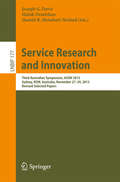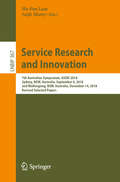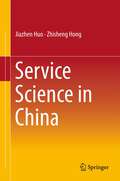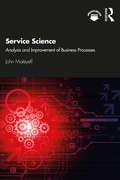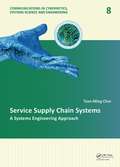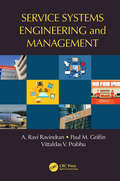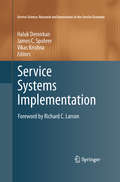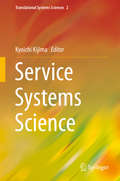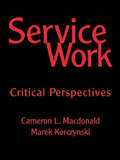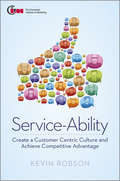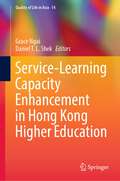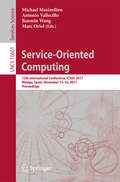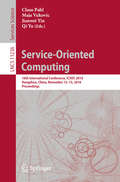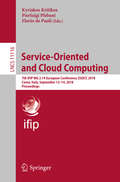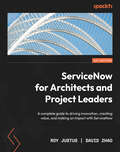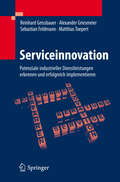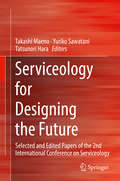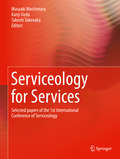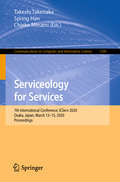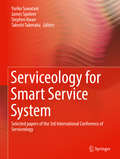- Table View
- List View
Service Research and Innovation
by Haluk Demirkan Joseph G. Davis Hamid R. Motahari-NezhadThis book constitutes the thoroughly refereed proceedings of the Third Australian Symposium on Service Research and Innovation, ASSRI 2013, held in Sydney, NSW, Australia, in November 2013. Overall, eight research papers were carefully reviewed and selected from 18 submissions. They are multidisciplinary in scope and cover strategic, organizational, and technological dimensions, ranging from purely conceptual to concrete implementations and testing of service-related technological platforms. Taken together, these papers provide a snapshot of the critical concerns and developments in service-related research and cover some of the key areas of research focus.
Service Research and Innovation: 7th Australian Symposium, ASSRI 2018, Sydney, NSW, Australia, September 6, 2018, and Wollongong, NSW, Australia, December 14, 2018, Revised Selected Papers (Lecture Notes in Business Information Processing #367)
by Sajib Mistry Ho-Pun LamThis book constitutes revised selected papers from the Australasian Symposium on Service Research and Innovation, ASSRI 2018. The conference was held in two parts on September 6, 2018, in Sydney, Australia, and on December 14, 2018, in Wollongong, Australia. The 9 full and 2 short papers included in this volume were carefully reviewed and selected from a total of 26 submissions, covering a variety of topics related to service-oriented computing and service science. The book also includes 3 keynote papers.
Service Science in China
by Zhisheng Hong Jiazhen HuoA service economy era is coming! As the basic discipline of service dominant era, service science mainly studies common rules of service activities, aiming to provide theoretical bases for creating service value in the new era. The book, which integrates knowledge of service management, operational management, logistics and supply chain management, constructs a research system for this emerging discipline. Service science research system constitutes service philosophy, resource allocation, operational management and service technology. Many cases about China's service enterprises are incorporated in the book, in the hope of providing readers an insight into not only service science but also the development of China's service economy.
Service Science: Analysis and Improvement of Business Processes
by John MaleyeffTo remain relevant in today’s world, practitioners should presume that they have two jobs: first, to do their work effectively so that they provide value to the organization; second, to improve how the work is done so that their organization remains competitive. This book offers clear guidance to excel at this ubiquitous second job. Informed by an appreciation that most personnel that work in any firm, even firms that are manufacturing-oriented, routinely provide services as a key element of their jobs, this book explains how to provide and improve internal customer service, regardless of industry or role. It illustrates the common features, or service process "DNA," while providing a diverse set of examples to enhance understanding. Written by a pioneer in the development of principles and methodologies that address services in a structured and distinctive manner, this book stresses that service processes are distinctly different from manufacturing processes. Rigorous and practical, this book will appeal to students and professionals alike, in business, hospitality, industrial management, public health, and other fields. Online resources include Excel files that act as templates to help with quantitative analysis routines.
Service Science: Analysis and Improvement of Business Processes
by John MaleyeffTo remain relevant in today’s world, practitioners should presume that they have two jobs: first, to do their work effectively so that they provide value to the organization; second, to improve how the work is done so that their organization remains competitive. This book offers clear guidance to excel at this ubiquitous second job.Informed by an appreciation that most personnel that work in any firm, even firms that are manufacturing-oriented, routinely provide services as a key element of their jobs, this book explains how to provide and improve internal customer service, regardless of industry or role. It illustrates the common features, or service process "DNA," while providing a diverse set of examples to enhance understanding. Written by a pioneer in the development of principles and methodologies that address services in a structured and distinctive manner, this book stresses that service processes are distinctly different from manufacturing processes.Rigorous and practical, this book will appeal to students and professionals alike, in business, hospitality, industrial management, public health, and other fields.Online resources include Excel files that act as templates to help with quantitative analysis routines.
Service Supply Chain Systems: A Systems Engineering Approach (Communications in Cybernetics, Systems Science and Engineering)
by Tsan-Ming ChoiSupply chain management is a well-developed area. The traditional supply chains are dynamic systems which include the forward and reverse flows of physical products and the related information and fund. However, a service supply chain is different because the real "product" may take the form of a "service" which implies that many traditionally cruc
Service Systems Engineering and Management (Operations Research Series)
by A. Ravi Ravindran Paul M. Griffin Vittaldas V. PrabhuThis new textbook will provide state-of-the-art models, concepts and solution methods important in the design, control, operation, and management of service systems. It will cover supply chain management, warehouse & distribution, financial engineering, revenue management in airlines, retail engineering, health systems, and financial services, etc... The textbook is for the engineering market, emphasizing the application of operations research models to optimally design and manage service systems. Currently, no such textbook exists in the market. Service management textbooks tend to be focused on the business school audience and therefore treat the topic overly, or exclusively, qualitatively. Many do not include health systems, retail industries, or financial sectors in their coverage.
Service Systems Implementation
by James C. Spohrer Vikas Krishna Haluk DemirkanService Systems Implementation provides the latest applications and practices aimed at improving the key performance indicators of service systems, especially those related to service quality, service productivity, regulatory compliance, and sustainable service innovation. The book presents action-oriented, application-oriented, design science-oriented (artifacts building: constructs, models, methods and instantiations) and case study-oriented research with actionable results by illustrating techniques that can be employed in large scale, real world examples. The case studies will help visualize service systems along the four key dimensions of people, information, technology and value propositions which can help enable better integration between them towards higher value propositions. The chapters, written by leading experts in the field, examine a wide range of substantive issues and implementations related to service science in various industries. These contributions also showcase the application of an array of research methods, including surveys, experiments, design science, case studies and frameworks, providing the reader with insights and guidelines to assist in building their own service systems, and thus, moving toward a more favorable service customer and provider experience. Service Systems Implementation, along with its companion text, The Science of Service Systems, is designed to present multidisciplinary and multisectoral perspectives on the nature of service systems, on research and practice in service, and on the future directions to advance service science. These two volumes compose a collection of articles from those involved in the emerging area known as service science.
Service Systems Science
by Kyoichi KijimaThe present volume illustrates a rich and promising research field in service, service systems sciences, by combining and fusing two strands of sciences: the science of service systems and systems sciences of service. The scale, complexity, and interdependence of today's service systems have been driven to an unprecedented level by globalization, demographic changes, and technology developments, so that it is absolutely necessary now for us to cultivate a new frontier of service research. In response, service science has emerged during the past decade as a transdisciplinary research field that aims to clarify, analyze, and design the structure and process of service systems. Service science is strongly motivated to prove the science of service systems. To deal with complexity, interactions, and the network of, in, and among service systems, we need to take a more systemic view. Because systems sciences offers a way of thinking in relationships and interaction and theories and models to address complexity, it is legitimate to develop systems sciences of service by explicitly focusing on systemic properties of service and service systems. As a volume of the Translational Systems Sciences series, this book emphasizes, in particular, a translational systems sciences perspective when the authors are approaching service, service systems, and service innovation. Indeed, the book employs systems sciences as a common framework or language not only to approach service in a holistic way but also to take a translational approach aiming to explain, analyze, design, and support service systems and their evolution.
Service Work: Critical Perspectives
by Cameron Lynne Macdonald Marek KorczynskiEveryday, we are bombarded with advertising images of the smiling service worker. The book is written with the aim of focusing beneath the surface of these fairy tale images, to seek out and understand the reality of service workers experience. Within the sociology of work and related literatures, there are an increasing number of empirical studie
Service-Ability: Create a Customer Centric Culture and Achieve Competitive Advantage
by Kevin RobsonTimes have changed. Long gone are our days of being kings of the manufacturing industry, we are now immersed in the world of ‘service’ where the relationship between an organization and the customer is an integral part of the "product" offering. The nation is suffering from a widespread lack of truly customer-satisfying service. We lack the very thing that we need to make this new paradigm work efficiently: service-ability. Organizations of all kinds are facing high customer churn, serious customer antagonism, loss of consumer confidence and plummeting customer satisfaction. Research shows that totally satisfying the customer is the only thing that will secure loyalty and offer significant competitive advantage. Yet still, on a daily basis we encounter service that frustrates us. Whilst the emergence of technology has no doubt brought efficiency to many areas of business activity, including the third sector, it has led to the standardised and indifferent service we regularly receive. We appear to have lost sight that people do business with people. Through efficient technology, our organisations may be serviceable but they are not service able.The arrival of Generation Y and the developments in social media, provide businesses with a whole new way to engage with their customers, but also provide a new way for customers to rate companies, products and services: not always in a positive manner. ‘Like’ or ‘#Fail’ have become part of our social language. Organizations that refocus on the need to treat customers in a way that satisfies them, and not the technology, will have better customer retention, lower costs of replacement and will build their brand value through better reputations. Service-Ability delves deeply into these areas to show how today's managers need to re-think the way we structure, manage, lead and organize our companies to achieve total ‘customer-centric’ work cultures that develop lasting relationships with customers.
Service-Dominant Logic
by Robert F. Lusch Stephen L. VargoIn 2004, Robert F. Lusch and Stephen L. Vargo published their groundbreaking article on the evolution of marketing theory and practice toward "service-dominant (S-D) logic", describing the shift from a product-centred view of markets to a service-led model. Now, in this keenly anticipated book, the authors present a thorough primer on the principles and applications of S-D logic. They describe a clear alternative to the dominant worldview of the heavily planned, production-oriented, profit-maximizing firm, presenting a coherent, organizing framework based on ten foundational premises. The foundational premises of S-D logic have much wider implications beyond marketing for the future of the firm, transcending different industries and contexts, and will provide readers with a deeper sense of why the exchange of service is the fundamental basis of all social and economic exchange. This accessible book will appeal to students, as well as to researchers and practitioners.
Service-Learning Capacity Enhancement in Hong Kong Higher Education (Quality of Life in Asia #14)
by Daniel T. L. Shek Grace NgaiThis book provides an in-depth, multi-faceted look into capacity building for service-learning, using the case of the higher education landscape in Hong Kong. Service-learning has been proven to be an effective pedagogy for the holistic development of students, as well as promotion of their well-being. It also attempts to promote the well-being of the service recipients and the community. While service-learning is becoming increasingly popular in many higher educational institutions around the world, the learning gains that can be attained from service-learning are only as good as the learning experience allows, and poorly-developed or motivated service-learning may potentially do adverse harm to students and the community. This book reinforces the imperative to enhance the capacity of the institution, teachers, students and community partners by exploring a diverse range of methods for achieving capacity building among different stakeholders. Examples of the methods explored include formal course-based professional development, scale development, action research, and communities of practice. Furthermore, the book includes a series of detailed, qualitative case studies that are aimed at embodying good practice, unpacking “what matters” from service-learning. Aa a useful resource for scholars and educators who are passionate about holistic youth leadership development, this book is also relevant to researchers in the intersection between well-being and higher education.
Service-Oriented Computing: 15th International Conference, ICSOC 2017, Malaga, Spain, November 13–16, 2017, Proceedings (Lecture Notes in Computer Science #10601)
by Michael Maximilien, Antonio Vallecillo, Jianmin Wang and Marc OriolThis book constitutes the proceedings of the 15th International Conference on Service-Oriented Computing, ICSOC 2017, held in malaga, Spain, in November 2017. The 33 full papers presented together with 20 short papers and 4 keynotes in this volume were carefully reviewed and selected from 179 submissions.The selected papers cover a wide variety of important topics in the area of service-oriented computing, including foundational issues on service discovery and service-systems design, business process modelling and management, economics of service-systems engineering, as well as services on the cloud, social networks, the Internet of Things (IoT), and data analytics.The chapter "Risk-based Proactive Process Adaptation" is available open access under a CC BY 4.0 license via link.springer.com.
Service-Oriented Computing: 16th International Conference, ICSOC 2018, Hangzhou, China, November 12-15, 2018, Proceedings (Lecture Notes in Computer Science #11236)
by Qi Yu Claus Pahl Maja Vukovic Jianwei YinThis book constitutes the proceedings of the 16th International Conference on Service-Oriented Computing, ICSOC 2018, held in Hangzhou, China, in November 2018. The 63 full papers presented together with 3 keynotes in this volume were carefully reviewed and selected from numerous submissions. The papers have been organized in the following topical sections: Microservices; Services and Processes; Service Trust and Security; Business Services and Processes; Edge + IoT Services; Social and Interactive Services; Recommendation; Service Analytics; Quality of Service; Service Engineering; Service Applications; Service Management.
Service-Oriented and Cloud Computing: 7th IFIP WG 2.14 European Conference, ESOCC 2018, Como, Italy, September 12-14, 2018, Proceedings (Lecture Notes in Computer Science #11116)
by Flavio De Paoli Kyriakos Kritikos Pierluigi PlebaniThis book constitutes the refereed proceedings of the 7th IFIP WG 2.14 European Conference on Service-Oriented and Cloud Computing, ESOCC 2018, held in Como, Italy, in September 2018. The 10 full and 5 short papers presented in this volume were carefully reviewed and selected from 32 submissions. The volume also contains one invited talk in full paper length. The main event mapped to the main research track which focused on the presentation of cutting-edge research in both the service-oriented and cloud computing areas. In conjunction, an industrial track was also held attempting to bring together academia and industry through showcasing the application of service-oriented and cloud computing research, especially in the form of case studies, in the industry.
ServiceMaster Industries, Inc.
by James L. HeskettThe CEO of ServiceMaster Industries has convened an internal task force to come up with ideas for reorganizing the company to accommodate unusually fast growth. In developing both alternatives and criteria for appraising them, the task force has to keep in mind the strong company culture.
ServiceNow for Architects and Project Leaders: A complete guide to driving innovation, creating value, and making an impact with ServiceNow
by Roy Justus David ZhaoGain insight and strategic advice for driving value in your organization with this practical guide that condenses a decade of ServiceNow wisdom into the must-know essentials for impactful deploymentsKey FeaturesFocus on what to do when shaping and leading a ServiceNow journeyExplore strategies for making your projects impactful and valuableGuidance for leaders at every level to maximize return on their investments in ServiceNowBook DescriptionServiceNow is the leading enterprise service management platform that enables the effective management of services in a modern enterprise.In this book, you'll learn how to avoid pitfalls that can challenge value realization, where to focus, how to balance tradeoffs, and how to get buy-in for complex decisions. You'll understand the key drivers of value in ServiceNow implementation and how to structure your program for successful delivery. Moving ahead, you'll get practical guidance on the methods and considerations in securely using ServiceNow. You'll also learn how to set up a multi-instance environment including best practices, patterns and alternatives in the use and maintenance of a multi-instance pipeline. Later chapters cover methods and approaches to design processes that deliver optimal ROI. Further, you'll receive tips for designing technical standards, designing for scale, ensuring maintainability, and building a supportable instance. Finally, you'll focus on the innovative possibilities that can be unlocked in a ServiceNow journey which will help you to manage uncertainty and claim the value of being an early adopter.By the end of this book, you'll be prepared to lead or support a ServiceNow implementation with confidence that you're bringing not only a solution but also making an impact in your organization.What you will learnUnderstand the key drivers of value in ServiceNow implementationStructure your ServiceNow programs for successful deliveryDiscover methods and tools for securely using ServiceNowSet up a multi-instance environment with best practices and patternsArchitect and lead the deployment of AI capabilities in ServiceNowBuild innovative experiences using NLU, virtual agents and the Now Experience FrameworkWho this book is forThis book is for architects, consultants and project leaders looking to drive value by applying ServiceNow effectively and efficiently. Platform administration or development experience is useful but not necessary to get the most out of this book. However, some familiarity with the modules and features of ServiceNow is expected.
Serviceinnovation
by Matthias Toepert Alexander Griesmeier Reinhard Geissbauer Sebastian FeldmannAuch Unternehmen, die sich hauptsächlich auf die technische Entwicklung und Herstellung ihrer Produkte konzentrieren, müssen neue Kunden gewinnen und langfristig an sich binden. Das Buch bietet eine Anleitung für den Weg hin zum industriellen Dienstleistungsunternehmen: An Beispielen führender Industriebetriebe (Automotive, Maschinenbau, Informationstechnologie) wird erläutert, welche Konzepte nachhaltig zum Erfolg führen. Mit Tools zur Einschätzung der eigenen Serviceleistung und -reife, Schritt-für-Schritt-Anleitungen und Handlungsempfehlungen.
Serviceology for Designing the Future
by Yuriko Sawatani Takashi Maeno Tatsunori HaraThis book provides a useful overall guide to the state of the art in theory and practice of services. It can also serve as a reference book for researchers in various fields, including engineering, marketing, economics, and other disciplines. Advanced works presented here were selected from the proceedings of the Second International Conference on Serviceology (ICServ2014), held September 14-16, 2014. This book helps readers to understand serviceology, which tackles with a broad range of services, the globalization of the economy and also enhances the quality of life of local residents.
Serviceology for Designing the Future: Selected and Edited Papers of the 2nd International Conference on Serviceology
by Yuriko Sawatani Takashi Maeno Tatsunori HaraThis book provides a useful overall guide to the state of the art in theory and practice of services. It can also serve as a reference book for researchers in various fields, including engineering, marketing, economics, and other disciplines. Advanced works presented here were selected from the proceedings of the Second International Conference on Serviceology (ICServ2014), held September 14–16, 2014. This book helps readers to understand serviceology, which tackles with a broad range of services, the globalization of the economy and also enhances the quality of life of local residents.
Serviceology for Services
by Masaaki Mochimaru Kanji Ueda Takeshi TakenakaServices are key activities in the globalization of the economy and also underlie the quality of life of local residents. The advanced work presented in this book was selected from the proceedings of the First International Conference on Serviceology (ICServ2013), held October 16-18, 2013 in Tokyo. This book provides a useful overall guide to the state of the art in theory and practice of services for researchers in various fields, including engineering, marketing, economics, and others. This work also facilitates the scientific systematization of services and promotes technological developments for solutions of industrial issues.
Serviceology for Services: 7th International Conference, ICServ 2020, Osaka, Japan, March 13–15, 2020, Proceedings (Communications in Computer and Information Science #1189)
by Takeshi Takenaka Spring Han Chieko MinamiThis book constitutes the refereed proceedings of the 7th International Conference on Serviceology for Services, held in Osaka, Japan, in March 2020.The 16 full papers and 3 short papers presented in this volume were carefully reviewed and selected from 58 submissions. The papers are organized around the following topics: hospitality management; service innovation and employee engagement; service marketing and consumer behavior; customer experience and service design; service engineering and implementation.
Serviceology for Services: Selected papers of the 1st International Conference of Serviceology (Communications In Computer And Information Science Ser. #1189)
by Masaaki Mochimaru Kanji Ueda Takeshi TakenakaServices are key activities in the globalization of the economy and also underlie the quality of life of local residents. The advanced work presented in this book was selected from the proceedings of the First International Conference on Serviceology (ICServ2013), held October 16–18, 2013 in Tokyo. This book provides a useful overall guide to the state of the art in theory and practice of services for researchers in various fields, including engineering, marketing, economics, and others. This work also facilitates the scientific systematization of services and promotes technological developments for solutions of industrial issues.
Serviceology for Smart Service System
by Yuriko Sawatani Takeshi Takenaka James Spohrer Stephen KwanServices are key activities in a globalized economy and they also underlie the quality of life of local residents. The advanced work presented in this book was selected from the proceedings of the Third International Conference on Serviceology (ICServ2015), held July 7-9, 2015, in San Jose, CA, USA. The conference was supported by the Society for Serviceology. The society was established in 2012 in Japan to explore the scientific systematization of services and to promote technological developments for solutions to industrial issues. This book provides a useful general guide to the state of the art in the theory and practice of services. It can also serve as a valuable reference book for researchers in a wide range of fields from engineering to marketing and economics.
